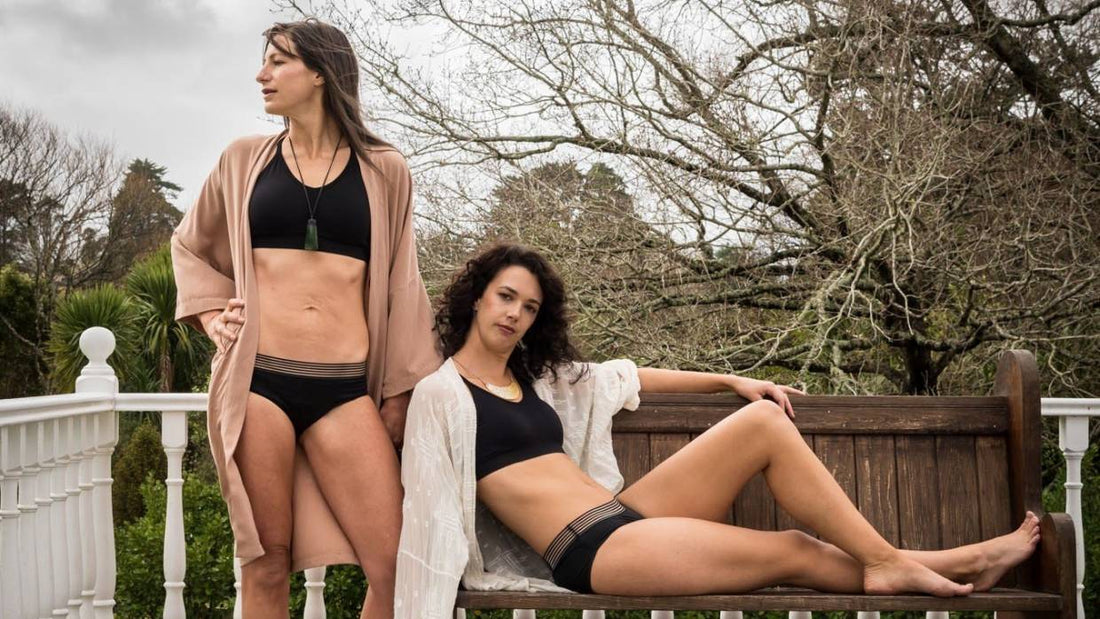
AWWA: the new business providing an alternative to single use menstrual products

An Auckland startup has created New Zealand's first period pants. I am Eva (now AWWA) is giving women another choice when it comes to menstrual products, while reducing environmental impact.
Periods are often a headache for women. But each tampon or sanitary pad can be a 500-year long problem for the planet. That's at least how long it takes for plastics to decompose, and most sanitary items are partially made from plastic. An organic tampon will take around five years to decompose, but will still end up in landfill.
Women are using on average around 11,000 tampons in a lifetime, and a year's worth of sanitary products leaving a carbon footprint of 5.3 kilograms of carbon dioxide equivalent.
AWWA was founded last year by serial entrepreneurs Kylie Matthews and Michele Wilson who wanted to find an alternative to single use menstrual products.

Matthews founded Kai Carrier and Wilson is the woman behind Frankie Apothecary.
"We're both very into sustainability and reducing waste output," Matthews said.
Menstrual cups have been gaining in popularity, providing a green alternative to tampons and pads, but these women wanted something a little less daunting for their daughters.
"Michele and I have got four daughters between us and we were talking about what was out there in terms of menstrual products for women, Matthews said.
"I was a cup user and Michele was using pads and we were talking about what we were going to use for our children. It got me thinking that I wouldn't feel comfortable giving my 12-year-old daughter a menstrual cup and being like, here you go darling, try and figure this out for your first period," Matthews said.
The women spent a year doing research and development, Wilson said, and found that fabric technology had come a long way, and it was possible to create underwear that was able to absorb a significant amount of fluid and still look and feel like normal underwear.
The women have developed a pair of high-tech undies that can hold the same volume of blood as two tampons and uses similar fabric technology to competing brands, with four different layers that gives the underwear the necessary properties.
Mathews explains that as well as being highly absorbent, the underwear remains dry, has an anti-microbial layer that prevents odour, and is leak proof. "The absorbent layer is made from bamboo fibre, and will last at least a good couple of years".
The period underwear doesn't come cheap, but like a menstrual cup, they are an up-front investment that paid off over time, while also working for the environment, Matthews explains. "We've worked it out that you would have paid it off after about 6 months of single use products," she states.
New York-based Thinx has been selling similar underwear since 2014 and Australian Modibodi started in 2016, but AWWA has its sights on the local market. "What we wanted to do was to make our underwear affordable for New Zealanders because if you're buying from overseas you've got to deal with the exchange rate and then the international shipping, and that just puts it out of reach for a lot of New Zealanders," Matthews said.
However, Wilson said that the pair had been developing new technology for AWWA's underwear that would provide a "point of difference" from its competitors, which would be unveiled this year.
The level of demand has taken the company by surprise. AWWA smashed its Kickstarter target of $27,000 to raise $75,000, and since launch it has struggled to keep up with orders, Matthews said.
"One of the biggest issues that we've faced since launching is that the sheer number of underwear that we have sold has blown every expectation that we had.
"We've had to increase our order sizes already, which has caused a few delays at the point of manufacture. We have pre-orders on the website and its just gone berserk," she said.
AWWA has sold more than 3000 pairs of period underwear worth $120,000, Wilson said.
The women have plans to scale up over the next two years, with their Sri Lankan supplier also gearing up to meet the demand.
AWWA will donate 5 per cent of profits to New Zealand charities raising awareness of the issue of period poverty and offers customers a buy-one-donate-one option.

